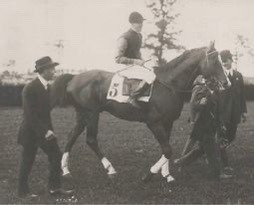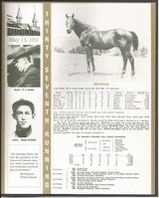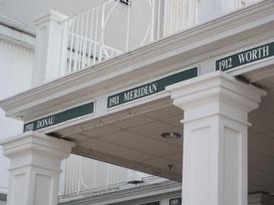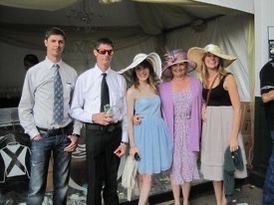
George Archibald, Kentucky Derby winning jockey aboard Meridian was a Jockey of the Kings
Valerie Archibald Embrey never met her grandfather, George Archibald, who passed away a quarter of a century before she was born, but written history, factual stories and a bevy of cherished family photographs to document Archibald’s accomplishments, give Embrey plenty of reasons to proudly beam about her grandfather and his achievements as one of great thoroughbred jockeys of his time.
George Archibald was born April 24, 1890, in Redding California. The son of a pharmacist, Archibald was small in stature, athletic and loved horses. A perfect blend for becoming a rider. Aiding young Archibald’s efforts was the fact his cousins were already making a career of being jockeys, “So my grandfather decided to follow in their footsteps”, said Embrey. “He began riding at age thirteen under the tutelage of his cousins at Emeryville Racecourse in Oakland”, she added.
Archibald eventually recorded his first win at Latonia Racecourse in Kentucky and quickly his prowess as a young jockey caught the attention of American financier and major owner/breeder of thoroughbred racehorses, August Belmont II, who brought Archibald to New York City in 1909 to fill in for his regular rider who was suspended. Archibald took full advantage of his good fortune and successfully rode many of Belmont’s horses.
During the spring and summer of 1910, Archibald accumulated several major stakes wins, including the Brighton and Suburban aboard business magnate Richard T. Wilson’s, Olambala, “One of my grandfather’s favorite horses”, stated Embrey. Archibald divvied up his time riding in the east and west, and one time in Los Angeles he suffered a terrible fall while his horse was leading the way. Behind him, twenty horses rumbled on by, and Archibald was stepped on, with the impact leaving the jockey unconscious for six weeks in the hospital. When Archibald awoke, there was the mark of a horseshoe on his lower back. “My grandfather always commented that it was his lucky horseshoe”, said Embrey.
During his success as an American jockey, Archibald took advantage of the monetary earnings he was receiving to give a big surprise to his mother, who was in love with a certain house she saw but thought of it as unattainable due to its high price. Archibald secretly bought it and gave it to her. “His mother’s face of joy was one of the great satisfactions of his life”, stated Embrey
By the fall of 1910, anti-gambling laws went into effect, eliminating horse racing in most states, including New York, however, Kentucky, was not affected by the ban and carried on with the sport, therefore, preserving the Kentucky Derby.
The following year, Archibald sported the colors of owner Richard Carman Jr., aboard the millionaire’s three-year old colt, Meridian, in the 37th renewal of the Kentucky Derby.
With the minimum bet lowered from $5 to $2, making it easier than ever for bettors to make a wager, the twenty-one pari-mutuel machines installed at Churchill Downs did a big business on Derby Day. Most of the money channeled through those betting machines centered on three horses: Governor Gray, the even money favorite, Meridian, the 5-2 second choice and the filly, Round the World, at third choice of 6-1 odds. The others were in double-digits.
At 5 pm on May 13, with the racing strip dry and fast, 25,000 fans of the sport of kings witnessed Meridian take the lead at the start in the field of seven runners and make every post a winning one, setting a Derby record for the mile and a quarter with a winning time of 2:05. Governor Gray made a late furious rush through the stretch, but Archibald tapped Meridian one time and the colt responded with a burst of speed to prevail by three-quarters of a length. Round the World tired from her early efforts of chasing the leader and finished sixth. Cheers greeted Meridian when the garland of roses was placed around his neck and the bouquet of American Beauties was handed to jockey Archibald. Meridian’s Derby victory was jockey George Archibald’s only classic mount in the United States.
Due to the turmoil surrounding the horseracing industry following the closure of racetracks, several American jockeys, including Archibald, headed to Europe to continue to ride, and it was on that continent that Archibald had his greatest success.
He began riding in Germany and in his initial year there he captured the first of many important stakes wins in the Preis des Winterfavoriten, an event that he would subsequently win again five years later. After three years, Archibald returned to the United States in 1914 to marry Claire Hamel, a dancer whom he had been introduced to by a friend while in Germany. “From the time they met until the wedding was four months”, said Embrey. “He was always very much in love with his wife and said that the most dangerous fall of his career was the night he met Claire”.
Upon his return to Germany six months later, Archibald wore the colors of Baron Alfred von Oppenheim’s Schlenderhan Stable just before World War I broke out. When the war started, Archibald, along with other riders were briefly confined in a prison camp. Through diplomatic channels, Archibald was given special permission to resume riding and rode Oppenheim’s horse, Masher, to victory in the Grand Prix at Hamburg in 1915.
During his time in Germany, Archibald also rode for King Wilhelm II and was Champion Jockey four consecutive years (1913-1916). Seven times he captured classic races in Germany, including the countries two most important: German St. Leger (1912, 1913) and the German 2000 Guineas (1913, 1914). His mounts were also victorious in the Austrian Derby (1913), German Oaks (1913) and German Derby (1914).
“His Austrian Derby win (aboard Csardas) was one of the greatest joys of his career”, indicated Embrey, “As Germany had been trying to win the race for many years”.
In 1917, Archibald left Germany and moved on to Spain where he won many big races. He captured the Grand Premio de Madrid three consecutive years (1919,1920,1921). Archibald also rode many horses for King Alfonso XIII while in Spain. He also rode in France and in 1922, Archibald traveled to England to ride on a retainer for Clarehaven Stables in Newmarket. But there were many other owners seeking his services too and once again Archibald was summoned by royalty and found himself in the employment of King George V. Wearing the colors of the King, Archibald guided Town Guard, who was England’s best two-year-old in 1922, to victory in the New Stakes (now known as the Norfolk Stakes) at Ascot and the National Stakes at Sandown.
Before 1922 was completed, Archibald added three more classic wins to his resume: England’s 2000 Guineas – Irish 2000 Guineas and the Irish Derby. The latter two races aboard, Spike Island.
Two years later, Archibald had his best year, winning 52 races, one which saw him return to Ireland and capture his second Derby, this time in a dead heat on Zodiac.
“The one fact that I love is that he rode and won races for three Kings”, said Embrey. “The accomplishment earned him the Spanish nickname ‘El Jockey de los Tres Reyes’, ~ The jockey of the three Kings”.
After riding successfully in India, which was under British rule at the time, Archibald returned to England in 1927 to again ride at Newmarket. “According to my father, who was 12 years old when my grandfather passed away, one day in early April his dad went out for a morning run to lose weight. He was scheduled to ride five horses that afternoon at the track but started having severe stomach pains after the first race. However, my grandfather soldiered on through his last ride and went home, passing away later that night. His death was attributed to his constant struggle to make the weight necessary for riding, which took a toll on his heart”, explained Embrey.
Paying their respects at his farewell, the numerous friends and riding colleagues of Archibald remembered him as an extreme professional, a hard-working jockey, an excellent partner and loyal friend. In addition, Embrey added, “Everyone who knew my grandfather always said he was a quiet and humble man. He had a quiet way with horses”.
In 2011, Valerie Embrey and members of her family visited Churchill Downs to commemorate the 100th anniversary of her grandfather’s Kentucky Derby win. “Our two-day stay was very memorable. We were interviewed by the local news”, she said. “To top off our trip, the winning horse, Animal Kingdom, was trained by Graham Motion, who was also from Newmarket, like myself and moved to Middleburg, Virginia, like my family”, Embrey exclaimed.
Yes, how fitting that was. As if through Divine intervention, George Archibald had written the script for his granddaughters visit to the place where he made Kentucky Derby history. However, one thing is for certain, Archibald was smiling down. “That’s exactly what we said”, Embrey cried out.
On that bright afternoon in Kentucky over a century ago, George Archibald may have felt like a king. Afterall, he certainly was king of the jockeys that day, but he will always be best remembered as the ‘Jockey of the Kings’.
Photos Courtesy of Valerie Archibald Embrey






